|
|
|
Sort Order |
|
|
|
Items / Page
|
|
|
|
|
|
|
| Srl | Item |
| 1 |
ID:
146801
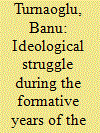

|
|
|
|
|
| Summary/Abstract |
The meaning of republicanism in Turkish political thought is unclear. It has been viewed as a force for modernization and secularization that reached its apotheosis in the Republic founded by Mustafa Kemal. Another widely accepted scholarly view is that the Turkish Republic and its ideology, Kemalism, emerged abruptly in 1923 without any intellectually substantial foundation. This article challenges these views and demonstrates, by contrast, that it is a mistake to understand Turkish republicanism exclusively in Kemalist terms. In the formative period of the Republic (1922–24), its intellectual founders crushed all contesting and rival political viewpoints. The new state's foundational ideology was the sole victor among competing conceptions of Islamic and liberal republicanism. Modern-day Turkish republicanism represents the outcome of centuries of intellectual dispute between these conceptions.
|
|
|
|
|
|
|
|
|
|
|
|
|
|
|
|
| 2 |
ID:
138907
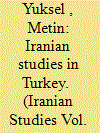

|
|
|
|
|
| Summary/Abstract |
Among other Middle Eastern countries, Iran and Turkey stand out as the two neighboring countries with many linguistic and cultural similarities. The question that comes to the fore is: to what extent do these two countries know each other? This article attempts to provide a picture of the state of Iranian Studies in Turkey with specific attention to three monographs originally written as PhD dissertations in various Turkish universities over the last three decades. Produced from within three different social science and humanities divisions, i.e. Political Science, Persian Literature and History, these are three of the very few scholarly monographs produced on Iran in Turkey. Based on a close reading of these studies, it seems possible to observe that they are mostly ill-balanced by methodological, ethnocentric as well as Turkish nationalist biases.
|
|
|
|
|
|
|
|
|
|
|
|
|
|
|
|
| 3 |
ID:
152610
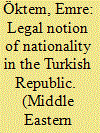

|
|
|
|
|
| Summary/Abstract |
Shortly after its emergence, the Turkish Republic adopted legislation inspired by European legal systems and traditions, including a law on nationality. The implementation of this law was affected by the staunchly nationalistic early republican policies which were not immune from the influence of the concept of ‘race’, as well as by the Ottoman legal conceptions on nationality based on religion, both of which guided the application of the new laws by the judiciary and the administration. This article proposes a critical legal approach to the issue of Turkish nationality, based on historical reflections. After a survey on the laws on nationality since the foundation of the Republic, it addresses the major confusions in connection with the concept of nationality in the light of textbooks from the relevant period, in order to observe, in conclusion, inherent and insolvable inconsistencies within the law, and a tenacious survival of Ottoman conceptions within the current law on nationality, especially with regard to religious minorities, which are assimilated to dhimmis in the legal subconscious and often equated to foreigners in practice.
|
|
|
|
|
|
|
|
|
|
|
|
|
|
|
|
| 4 |
ID:
151870
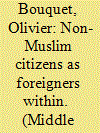

|
|
|
|
|
| Summary/Abstract |
Since the establishment of the Republic in 1923, any non-Muslim born in Turkey, whatever his/her religion, is a Turkish citizen as are any of his/her Muslim fellows. However, sometimes he/she might consider him/herself an alien and might even be regarded as such by the official authorities. The purpose of this article is to shed light on this reality from an historical perspective. Based on the comparison of two terms (ecnebi and yabancı, both meaning foreigner) that had become frequently used during the last Ottoman decades, the analysis establishes to what degree ecnebi was replaced by yabancı in official republic terminology. The article argues that this change might be related to the formation of less visible categories of foreigners that partly originated from the confessional imperial framework based on the differentiation between Muslims and non-Muslims. Far from being set aside as the Kemalists have long claimed, this framework has prevailed. It partly explains to what extent, as a result, in the history of the Turkish Republic, non-Muslim Turkish citizens have sometimes been regarded as ‘foreigners within’ (içerdeki yabancı).
|
|
|
|
|
|
|
|
|
|
|
|
|
|
|
|
| 5 |
ID:
158372
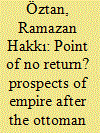

|
|
|
|
|
| Summary/Abstract |
In late 1912, the Ottoman imperial armies suffered a series of quick defeats at the hands of the Balkan League, comprising Greece, Serbia, Bulgaria, and Montenegro, resulting in significant territorial losses. The Ottoman defeat in the Balkan Wars (1912–13) often stands at the center of teleological accounts of a neat and linear transition from Ottoman Empire to Turkish Republic. These teleological readings see the Ottoman defeat as a historical turning point when Ottoman elites turned nationalist, discovered Anatolia, and embraced the Turkish core. This article contends that such approaches frame late Ottoman history in anticipation of the later reality of nation-states, and overlook the messy and historically complex nature of the collapse of empire and the emergence of the nation-state. Although the defeat was certainly shocking for the Ottoman ruling elite, I argue that it initiated an era of debate rather than one of broad consensus. Similarly, the defeat neither marked the end of the Ottoman Empire nor heralded the coming of the Turkish Republic, but rather reinvigorated the Ottoman imperialist project.
|
|
|
|
|
|
|
|
|
|
|
|
|
|
|
|
| 6 |
ID:
177266
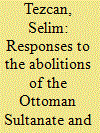

|
|
|
|
|
| Summary/Abstract |
This is a study of the responses of the Arabic and Hebrew press of Palestine to the abolitions of the Ottoman Sultanate and Caliphate. It is based on a comparative examination of the contemporary coverage of the events by the Arabic newspapers al-Karmil and Filastin and by the Hebrew newspapers Doar ha-Yom and Haaretz. The analysis yields valuable insights about how the Yishuv and the Palestinians viewed the abolitions of the Sultanate and Caliphate, the contemporary significance of these institutions, Kemalist Turkey, the rival population in Palestine, and Sharif Husayn. Mainly, it shows that the Hebrew press hailed the abolitions as revolutionary developments that would pave the road before the modernization of not only Turkey but the whole of Asia, while the Arabic press considered this too momentous a matter to be decided by Turkey alone and predicted adverse consequences for both that country and the East.
|
|
|
|
|
|
|
|
|
|
|
|
|
|
|
|
| 7 |
ID:
180289
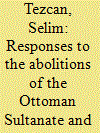

|
|
|
|
|
| Summary/Abstract |
This is a study of the responses of the Arabic and Hebrew press of Palestine to the abolitions of the Ottoman Sultanate and Caliphate. It is based on a comparative examination of the contemporary coverage of the events by the Arabic newspapers al-Karmil and Filastin and by the Hebrew newspapers Doar ha-Yom and Haaretz. The analysis yields valuable insights about how the Yishuv and the Palestinians viewed the abolitions of the Sultanate and Caliphate, the contemporary significance of these institutions, Kemalist Turkey, the rival population in Palestine, and Sharif Husayn. Mainly, it shows that the Hebrew press hailed the abolitions as revolutionary developments that would pave the road before the modernization of not only Turkey but the whole of Asia, while the Arabic press considered this too momentous a matter to be decided by Turkey alone and predicted adverse consequences for both that country and the East.
|
|
|
|
|
|
|
|
|
|
|
|
|
|
|
|
| 8 |
ID:
094820
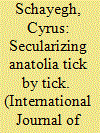

|
|
|
| 9 |
ID:
103468
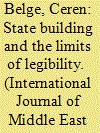

|
|
|
|
|
| Publication |
2011.
|
| Summary/Abstract |
When writing biographies of historical figures, narrative convention requires that concision and clarity be wrested from sources that are multiple and often confusing. In this article, I argue that multiple accounts of a person's life may be more than an accident arising from the way that information was compiled. Rather, such multiplicity renders exemplary figures adaptable to a wide variety of circumstances, making them even more useful as a focus of devotion and emulation. Examining multiple accounts of early Maliki scholar Sahnun b. Sa? id (d. 854), including those of his travels in search of knowledge and of his suffering under the mih.na (trial) in Kairouan, I find that close attention to apparently contradictory evidence may not get us any closer to understanding the man himself, but it does offer us much information about the ways in which he was considered an exemplary individual.
|
|
|
|
|
|
|
|
|
|
|
|
|
|
|
|
| 10 |
ID:
147947
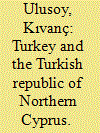

|
|
|
| 11 |
ID:
092968
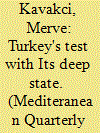

|
|
|
|
|
| Publication |
2009.
|
| Summary/Abstract |
Modern Turkey is experiencing one of its most defining moments since its inception. If the passage from one-party system to multiparty system in 1940 was one such turning point and if the period of Turgut Ozal's governance, which gave the country access to the international market for the first time, was a second, then the recent developments concerning Ergenekon, a layer of an undiscovered world of the Turkish deep state, is the third of its kind. Until almost the end of the 1990s, most Turks were oblivious to the somewhat enigmatic concept of a state within a state. In the days of discussion following the coup d'état of 1997, then-president Suleyman Demirel pointed out that the Turkish military was the deep state. Twelve years after Demirel's concession, observers know that the deep state goes beyond certain factions within the Turkish military and percolates into various facets of the state machinery. This article sheds light on the organization of the deep state, some of the underlying reasons behind its emergence, and its activities affecting the country's course of democratization or lack thereof. It argues that with the recent efforts of deconstructing the deep state, Turkey has ushered in a new era of democratization.
|
|
|
|
|
|
|
|
|
|
|
|
|
|
|
|
|
|
|
|
|